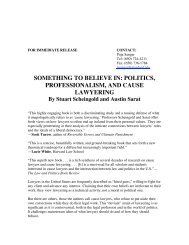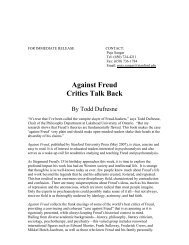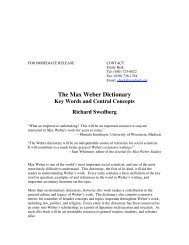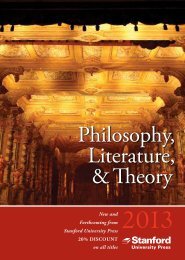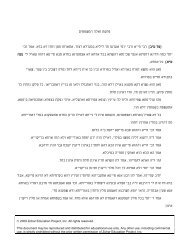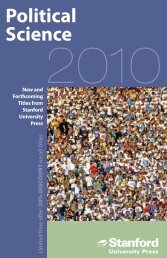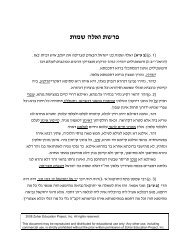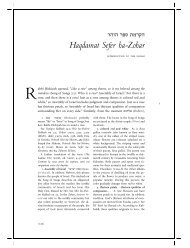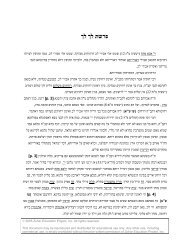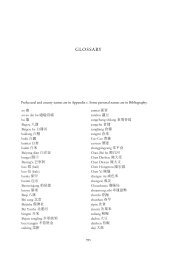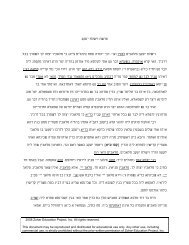Front Matter (PDF) - Stanford University Press
Front Matter (PDF) - Stanford University Press
Front Matter (PDF) - Stanford University Press
Create successful ePaper yourself
Turn your PDF publications into a flip-book with our unique Google optimized e-Paper software.
and rich ambiguity. Here the commentary is essential. When the<br />
potency,<br />
cannot adequately express a multifaceted phrase, I unfold the range<br />
translation<br />
meaningin the commentary. When the translation is as cryptic as the<br />
of<br />
Aramaic, the commentary rescues the stranded reader.<br />
original<br />
style of translation is literal yet poetic. I am convinced that a literal<br />
My<br />
the Zohar is not only the most accurate but also the most colorful<br />
renderingof<br />
zestfulÐthe best way to transmit the lyrical energy of the Aramaic. Still, at<br />
and<br />
the multivalent language invites a certain freedom of expression. Let me<br />
times,<br />
two related examples. In Zohar 1:83a, Rabbi Shim'on describes the nighttime<br />
cite<br />
journey of the soul, soaringskyward from her sleepingbody: ``Flying, she<br />
does this bizarre term mean? The Sperling-Simon translation renders<br />
What<br />
as ``certain bright but unclean essences.'' 20 The English translation of Tishby's<br />
it<br />
Wisdom of the Zohar reads: ``the deceivinglights of uncleanness,'' 21<br />
negohot)Ðroughly: ``vaulted splendors''Ðthough in his note he acknowledges<br />
(qimmurei<br />
that the meaning is ``doubtful.'' 22 I render the sentence as follows:<br />
she encounters those hooded, hunchbacked, dazzling demons of de-<br />
``Flying,<br />
The accompanyingcommentary explains that these are malevolent<br />
®lement.''<br />
who block the ascent of an unworthy soul. Qumrin derives via rabbinic<br />
forces<br />
from the Greek qamara, ''arched cover,'' while tehirin is a cognate of the<br />
usage<br />
tihara, meaning``brightness, noon.'' One class of demons is named<br />
Aramaic<br />
``noonday demons.''<br />
tiharei,<br />
teriqin). The Sperling-Simon translation renders this phrase as ``malignant<br />
(ḥavilei<br />
bands.'' 23 The English translation of Tishby's Wisdom of the Zohar reads:<br />
destructive powers.'' 24 I render it as ``ravaging bands of truculent<br />
``ill-intentioned<br />
stingers.'' The commentary explains that ḥavilei derives from either ḥevel,<br />
group,'' or the verb ḥvl, ``to injure, destroy.'' Teriqin derives from the<br />
``band,<br />
trq, ``to sting, bite.''<br />
root<br />
Hebrew anthology by Fischel Lachower and Isaiah Tishby, Mishnat ha-Zohar, and its<br />
the<br />
version, The Wisdom of the Zohar, trans. David Goldstein; and the recent English<br />
English<br />
edited by Michael Berg, The Zohar by Rabbi Shimon bar Yochai, which, however,<br />
translation<br />
based not on the original Aramaic but on Ashlag's Hebrew translation. For details on all<br />
is<br />
these, see the Bibliography.<br />
of<br />
The Zohar, trans. Harry Sperlingand Maurice Simon, 1:277.<br />
20.<br />
Tishby, Wisdom of the Zohar, trans. Goldstein, 2:818.<br />
21.<br />
Idem, Mishnat ha-Zohar, 2:134. He concludes by sayingthat the phrase may mean:<br />
22.<br />
lights.''<br />
``delusive<br />
The Zohar, trans. Sperlingand Simon, 2:19.<br />
23.<br />
Translator's Introduction<br />
encounters those<br />
(qumrin tehirin) ofde®lement.''<br />
QKZPG<br />
KZKFJ Q<br />
Y<br />
while<br />
\GFGDR<br />
KZGPKY<br />
Tishby's original Hebrew translation reads a bit differently:<br />
xiv<br />
KNKC<br />
QKYKZJ I<br />
virtuous soul who evades these demons reaches heaven and receives a<br />
The<br />
message. According to another Zoharic passage (1:130a), while descend-<br />
divine<br />
ingback to her sleepingearthbound body, the soul is assailed by<br />
24. Tishby, Wisdom of the Zohar, trans. Goldstein, 2:813.



